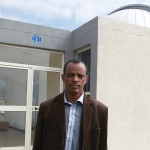- Stay Connected
From Africa to the stars: Why Ethiopia needs a space programme

We will see an Ethiopian astronaut in my lifetime, says Solomon Belay Tessema, the man behind the country’s space mission
Why does Ethiopia need a space programme?
A space programme is not a luxury, but a key to securing food, increasing the productivity of agriculture and developing scientific thinking. Space technology is important for many things: satellites, for instance, are used for environmental and water management, and soil assessment. We use them for disaster planning, to gather meteorological data and to improve communications. So a space programme is a key instrument for sustainable development.
Isn’t it an unnecessary extravagance, given that Ethiopia is not a wealthy country?
This comment is completely at odds with the realities of the 21st century. There are also people living below the poverty line in many developed countries. I believe that the only means of reducing poverty is to transform our agricultural economy though science and technology. China started a space programme around 1952, and India started in 1954. Were they an extravagance?
So far an observatory has been opened on Mount Entoto, near Addis Ababa. What will that be used for?
The main aim of the two telescopes at the Entoto Observatory is to study the properties of variable and binary stars, the Milky Way and other galaxies.
Another purpose of this observatory is to provide research and training in astronomy, space sciences, engineering and technology. Understanding astronomy will increase the scientific knowledge of our society. The observatory is also the headquarters for the Ethiopian space programme.
Isn’t light pollution a problem, given that the observatory is close to a big city?
Addis Ababa is growing and light pollution might become a problem within the next 10 years. Considering this, we are conducting site tests for a large optical and radio telescope on the mountains around Lalibela in the north of the country. It is expected to be one of the largest telescopes in the world, but a decision won’t be made until after we have results from tests at the site.
The world already has a number of large telescopes. Does it need another one?
The purpose of an astronomical observatory isn’t only to observe the sky, but to build capacity in research and training, encourage development of the space industry and establish strong international collaboration.
Africa cannot always rely on the technology and human capital of developed countries; it is time for us to build our own. The world needs strong astronomical infrastructure in Africa.
What are Ethiopia’s longer-term aspirations for space exploration?
The long-term aspiration of Ethiopia is to be one of the leading countries in space exploration and industry in Africa. I assure you that we will see an Ethiopian astronaut in my lifetime.
